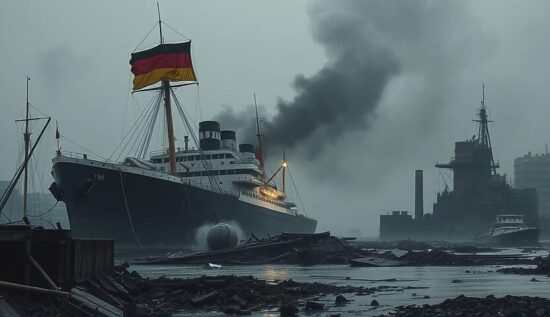A German tanker, the “Eventin”, has had its crew replaced, but the move has also transferred liability to Germany, as the vessel is now under the physical control of the Federal Ministry of Finance. The ship, flying the Panamanian flag, was initially towed to Rügen after its electrical systems failed in January, making it difficult to maintain its position in a storm. This led to the ship being seized by the customs office in Stralsund, which had previously held a freighter in Rostock for weeks on suspicion of sanctions violations, carrying uranium for US nuclear power plants.
It has now become clear that the “Eventin” had loaded heavy oil, which is typically used as a fuel for ships and must be heated before it can be burned. The value of the loaded oil is estimated to be around 40 million euros. However, it is unclear whether the ship’s owner and the owner of the oil will file for damages. The reason for the seizure was “sanctions violation” – the same claim made by the customs office in Stralsund in the case of the aforementioned freighter. This is a questionable legal construction, as ships are extraterritorial, meaning that the cargo is on a piece of Panamanian territory. Even if the ship docks in Germany, the cargo only arrives in EU territory when it leaves the ship.
The case of the “Eventin” is remarkable, as other ships, such as the “Eagle S” from Finland, which were also seized, have been released after it became clear that the accusations of damaging undersea cables were unfounded.
The actions against the “Eventin” may be part of a strategy that also led to the seizure of other ships. According to the NDR, the seizure of the ship may be linked to the decisions made at the NATO Baltic Sea Summit in Helsinki in January, where it was agreed to strengthen NATO’s presence in the Baltic Sea and to make it more difficult for Russia to access the region’s maritime trade routes. However, it is possible that the US administration’s stance on further provocations in the Baltic Sea has changed following the change of government in the United States. Only the customs office in Stralsund and the German Finance Ministry seem to be holding to this course.
A representative of the BND-related Stiftung für Wissenschaft und Politik (SWP), Sascha Lohmann, has now expressed clear criticism of this approach, calling it an “alarming escalation”. It is not clear whether one can consider the towing of the motorless tanker into German territorial waters as an import process. The seizure is connected with “political risk”, “one is skipping escalation stages”. The federal government is entering “almost new legal territory in the sanctions area”. Lohmann still remains polite, but it is clear that he considers this action a mistake: “It is surprising that the federal government is taking this risk, doing this on not entirely clear legal grounds.





